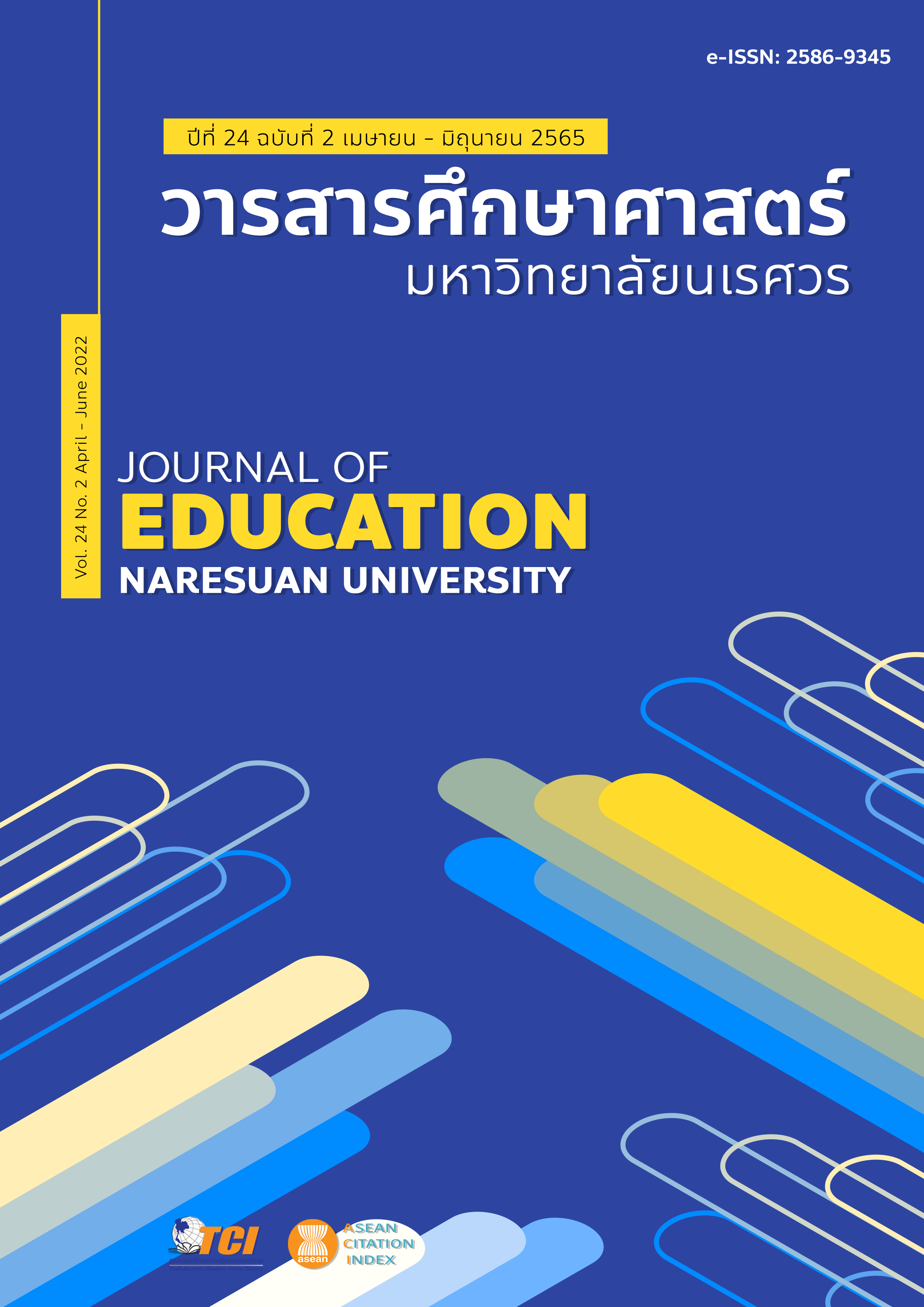DEVELOPMENT OF AN INNOVATIVE METHODS COURSE SUPPORTING PRE-SERVICE SCIENCE TEACHERS’ TECHNOLOGICAL PEDAGOGICAL AND CONTENT KNOWLEDGE: A CRITICAL PARTICIPATORY ACTION RESEARCH การพัฒนารายวิชาการสอนแนวใหม่ที่ส่งเสริมความรู้เนื้อหาผนวกวิธีสอนและเทคโนโลยีของนักศึกษาครูวิทยาศาสตร์ : การวิจัยปฏิบัติการเชิงวิพากษ์แบบมีส่วนร่วม
Main Article Content
Abstract
This research aimed to develop an innovative method course for fostering 54 pre-service science teachers’ technological pedagogical and content knowledge (TPACK). In addition, classroom observation was also used during pre-service science teacher practicum as follow-up case study to find out changes. The course activities were designed to emphasize on critical thinking, practice and reflection. Data were collected by using questionnaires, self-report of TPACK, semi-structured interviews, observation form, and lesson plans. The data analysis was done by using content analysis. For credibility of data triangulation. The results showed that the 32 pre-service teachers (59.25%) were worried that they did not have strong content knowledge would determine appropriate methods of teaching and the selection and utilization of technology. Accordingly, the course was modified by setting the content that pre-service teachers did not understand to be a practical topic in microteaching practicing. This resulted in that pre-service teachers had more accurate knowledge of the content. As field monitoring during the practicum, it was found that pre-service teachers could choose to use technologies such as PhET programs which suitably fitted with the chosen content and they also could design proper teaching methods that were in consistency with the context. This research results suggest that they need to check their content knowledge as priority before developing other competencies. As pre-service teachers have proper and correct content knowledge, they will be able to integrate technology into their pedagogy and content knowledge. In addition, for teacher preparation programs, the focus should be placed on TPACK integration as core competency, which pre-service teachers can use for their science learning management in order to help students achieve the goals and be responsive to society.
Article Details

This work is licensed under a Creative Commons Attribution-NonCommercial-NoDerivatives 4.0 International License.
The owner of the article does not copy or violate any of its copyright. If any copyright infringement occurs or prosecution, in any case, the Editorial Board is not involved in all the rights to the owner of the article to be performed.
References
Chatmaneerungcharoen, S. (2020). Enhancing in-service science teachers’ technological pedagogical content knowledge for STEM Education reflecting sufficiency economy. Journal of Rangsit University: Teaching & Learning. 14(1), 138-152.
Chamrat, S. (2017). Technology Integrated Learning. Bangkok: Charansanitwong Printing.
Faikhamta, C., Ketsing, J., Tanak, A., & Chamrat, S. (2018). Science teacher education in Thailand: A challenging journey. Asia-Pacific Science Education, 4(3). https://doi.org/10.1186/s41029-018-0021-8
Faikhamta, C. (2020). Strategies for teaching chemistry. Bangkok: CU press. [in Thai]
Freire, P. (1970). Education for critical consciousness. New York: Continuum Publishing.
Geng, H. (2016). Internet of thing and data analytics handbook. New Jersey: John Wiley.
Jang, S. J., & Chen, K.C. (2010). From PCK to TPACK: Developing a transformative model for pre-service teachers. Journal of Science Education and Technology, 19(6), 553-564.
Kemmis, S., McTaggart, R., & Nixon, R. (2014). The action research planner: Doing critical participatory action research. Singapore: Springer Singapore.
Knowles, M. S. (1980). The modern practice of adult education: From pedagogy to andragogy. New York: Cambridge, The Adult Education Company.
Kolb, A., & Kolb, D. (2011). Experiential learning theory: A dynamic, holistic approach to management learning, education and development. In Armstrong, S. J. & Fukami, C. (Eds.) Handbook of management learning, education and development. 10.4135/9780857021038.n3.
Lee, C. J., & Kim, C. (2014). Implementation study of a TPACK-based instructional design model in technology integration course. Educational Technology Research and Development, 62(4), 437-460.
Mishra, P., & Koehler, M. J. (2006). Technological pedagogical content knowledge: A new framework for teacher knowledge. Teachers College Record, 108(6), 1017–1054.
Office of the Education Council. (2018). Education in Thailand 2018. Bangkok: Prikwarn Graphic. [in Thai]
Teachers Council of Thailand. (2019). Regulations of the teachers council of Thailand on professional standards (issue 4) B.E. 2562. Bangkok: Khurusapha Publishing House. [in Thai]

